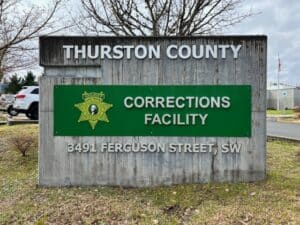
One of the frustrations for criminal defense attorneys is helping clients understand that criminal justice is not always just. It is not uncommon that two defendants who have been arrested for DUI will have very different outcomes depending on the county they were arrested. The primary factors that influence your defense outcome are: 1) the intensity of law enforcement in the area, 2) the workload of the prosecutors, 3) the size of the court system 4) the “culture” of the prosecutor’s office and 5) the amount of contact defense attorneys can have with the prosecutor. To illustrate, there are frequently very different outcomes in the counties that are within 30 miles of each other.
Mason County
In Mason County, the two best adjectives to describe their court system are archaic and inflexible. Not much has changed in that county for the nearly 20 years we have practiced. While surrounding counties have added computerized systems and creative types of resolution options to keep the courts more efficient, Mason has clung to their old ways. It is nearly impossible to have a phone conversation or get a response email from a prosecutor. For that reason, defense attorneys generally dislike practicing in Mason County. It takes a lot of driving out to Mason only to appear at a hearing and get nowhere in the negotiation process. Additionally, their fines are frequently very high. In our opinion, they seem inconsistent with the established law directing courts to take into account the defendant’s actual ability to pay.
Pierce County
Pierce County has moved to a more rehabilitative model and has several new paths for negotiating criminal resolutions. For example, if you qualify, there is a possibility that they will reduce the severity of a charge for a negotiated plea. The new methods of resolving cases with a more rehabilitate consideration is generally better for everyone—including the taxpayers. Often, the defendant really needs mental health care or treatment for addiction. When the defendant gets the treatment (usually on their on dime), the tax payers wins in terms of law enforcement avoiding repeat arrests, the prosecutor can hand the case over to probation rather than tie up jurors and a judge in a trial, and, with reduce repeat arrests, the public defenders can keep people off their caseload who simply just need treatment rather than jail time.
The challenge with Pierce is that the system of communication is very rigid. As a former prosecutor in Pierce County, Ryan is very familiar with the DPAs heavy caseloads. They are also tied to a very strict protocol that each deputy prosecutor must adhere to—creating very little flexibility in negotiating. For example, if the defense attorney points out a valid 3.6 Motion that could be a big issue for the prosecutor at trial, this does not mean the lower level prosecutor (often not many years out of law school) will have the authority to negotiate the case to a lower charge or a diversion-type of resolution, which is more appropriate. In our opinion, this is likely due in part to the size of the Pierce County criminal justice “machine” and the fact that, with so many deputy prosecutors, the elected Prosecutor is trying to keep uniformity in handling criminal cases. The downside is that, no matter what your unique circumstances or great legal defenses, the prosecutor likely has no authority to be creative in the resolution. If you have a great defense, you probably have to go to trial. That is always the least efficient and most costly option for everyone involved but, occasionally, it just needs to be done. Unfortunately, that means subpoenaing officers and keeping a prosecutor in trial for a day or two on a case that was “resolvable”—which is frustrating for everyone.
Kitsap County
Kitsap is moving in a much more rehabilitative model than surrounding counties. There have been quite a few additions to their Therapeutic Court. To increase the odds that recidivism will decrease, Kitsap tries to consider why the defendant is facing legal trouble. If it’s a untreated mental health issue or addiction, the prosecutor will likely consider an alternative resolution. There are facts in the criminal charging that can preclude a person from qualifying for the programs but, generally, a prosecutor will give defense counsel time to “pitch” a client’s case. This is, in part, due to the fact that Kitsap prosecutors have more autonomy in their position. In most cases, an individual deputy prosecutor is trusted to know how to resolve their case load in the most efficient and judicious manner. If an issue arises in which a defendant has a very unique set of circumstances, Kitsap prosecutors tend to be open to discussing a deviation from the “normal course” with a more senior prosecutor, if the facts warrant a unique resolution. For that reason, Kitsap is our favorite place to practice criminal defense.
There are many municipalities surrounding these counties that are also doing a good job at moving toward the various rehabilitative models. Whenever possible, the deputy prosecutors are trying to review the criminal case in a holistic manner and determine how to best reduce the chance for re-offense. This does not mean ignoring victims’ concerns but the goal is to see an efficient resolution that also increases the odds that the defendant will stay out of the criminal justice system in the future. They don’t all use the same methods of resolution but cities such as Port Orchard, Bremerton, and Poulsbo all share the goal of reducing recidivism through proper treatment.

Get help now
Whether you choose to handle your case alone or engage the Witt Law Group, being informed and prepared is essential. Early involvement of an attorney can significantly impact your chances of a fair recovery, allowing you to focus on healing while we handle negotiations with insurance adjusters to secure fair compensation for your injuries.




